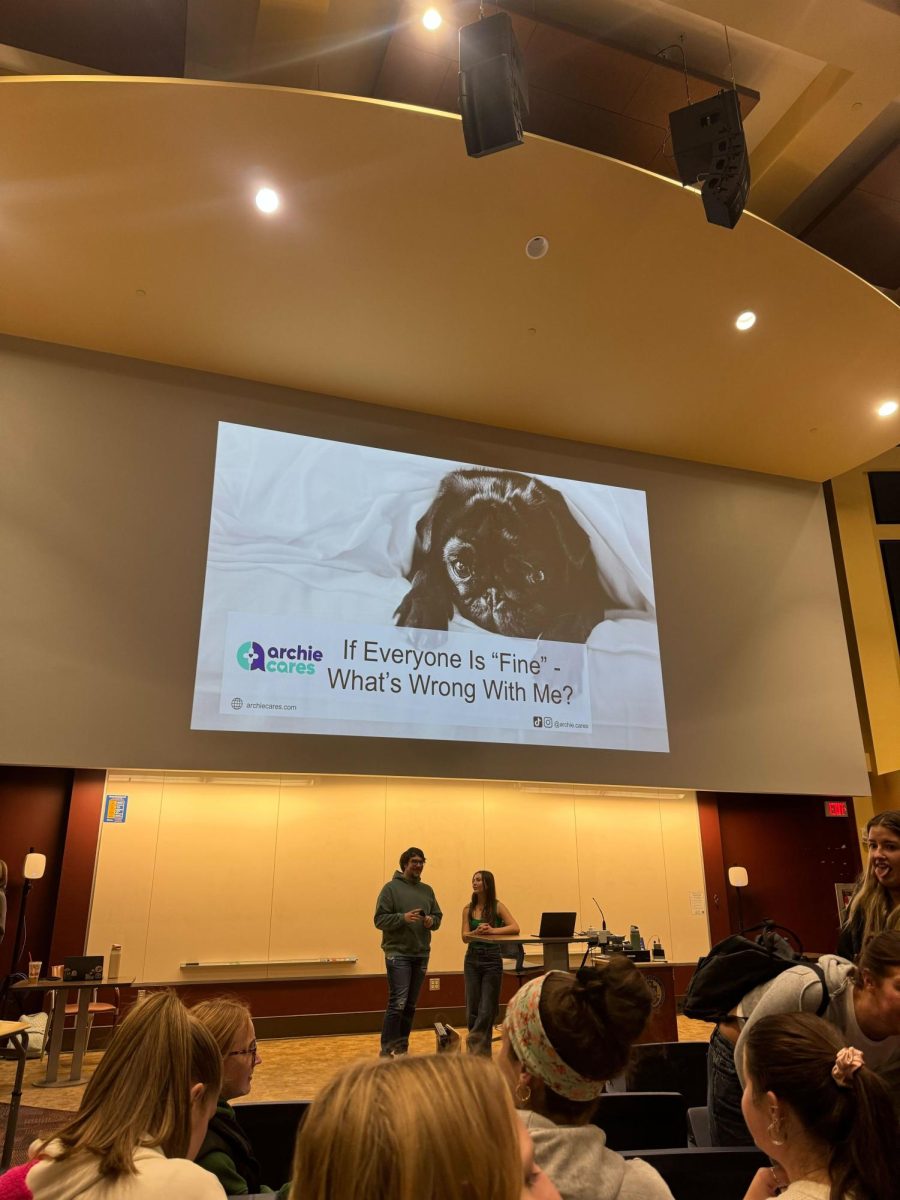Pitt takes pride in celebrating the entire Pitt community during Greek Week, not just those of the Fraternity-Sorority Life. Bringing in guest motivational speakers, singing karaoke in preparation for Saturday’s Greek Sing performances, hosting a clothing drive and holding other educational activities are vital to keeping the Pitt community close and tight-knit. Considering mental health is a concern for college students, the Greek Week team believed it made sense to discuss this topic with students before the semester ends.
“Archie Cares,” “The Feelings Guy” or Archie Messersmith-Bunting, is a motivational speaker who has returned to Pitt Greek Week for another year, on April 7, 2025, to touch on mental health and overcoming life’s obstacles, especially while in college. As someone who has faced it all — addiction, depression and financial struggles — Messersmith-Bunting believes sharing these hardships brings comfort and belonging to college students struggling silently. Beating the odds by overcoming these hardships has motivated Messersmith-Bunting to become a motivational speaker.
Before sharing his story, Messersmith-Bunting took a minute to credit Pitt for celebrating and communicating topics like mental health with the FSL community.
“I really applaud the FSL community here for adding something like this as a part of Greek Week. I speak all over the country, and there aren’t a lot of Greek Weeks that have something like this as a part of their experience,” Messersmith-Bunting said.
Messersmith-Bunting discussed anxiety, depression and worrying thoughts that college students often face because of academic stress, social life and university expenses.
“To take 50 minutes to just focus on yourself and think about how you can begin to tame this beast, our brain, to understand the way you’re wired a bit more, I think it is important for anyone to hear, but I think college students, like 18-25 year olds, who are trying to figure out what they are going to do with their life, who they are, you can never unknow this,” Messersmith-Bunting said.
Messersmith-Bunting, a member of the Sigma Phi Epsilon fraternity since 1994, went back to the moment he aspired to become a motivational speaker for college students, focusing on members in FSL. After graduating from Samford University, Messersmith-Bunting continued volunteering through his fraternity, as the brotherhood was a significant part of his undergraduate career.
“Someone said, ‘Hey, can you come and talk to the fraternity about recovery?’ And so I did, and I realized that I was a performer and loved being on stage. I loved getting to take people somewhere else for two hours. Whether they were laughing or crying, they weren’t thinking about their life.” Messersmith-Bunting said.
Thinking he would never experience this thrill of storytelling again, Messersmith-Bunting went to a camp where, talking to some students, he realized it could benefit more students than just his brothers.
“I can really help people. I’m so comfortable talking on stage,” Messersmith-Bunting said. “I’m not performing, but I’m just so comfortable talking about really tough parts of my life. To see young people get it, you can see the lightbulb go on. I said, ‘I gotta do this.’”
Taylor Shaner, sister of the Delta Phi Epsilon sorority and senior economics student, attended this event a second time after her positive experience last year.
“Hearing someone who was in a fraternity and didn’t have that picture-perfect, ‘I’m fine’ life, because I’m not fine when people ask me how I’m doing,” Shaner said. “I know I give that response even though I’m not so I like that he’s trying to change that dialogue.”
During Messersmith-Bunting’s talk titled, “If everyone else is ‘fine,’ then what’s wrong with me?” he shared valuable techniques to practice until perfection when it comes to shutting down moments of spiraling mental health, which can seem never-ending. Messersmith-Bunting urged students to take two minutes to stop, look at the floor and think, which he believes tricks your brain to stop overthinking.
“I learned this technique right out of rehab, so my brain is just going at all times. It’s nonstop up there,” Messersmith-Bunting said. “So, my task was to sit on my couch, open my phone, set a timer of 10 minutes and just let the thoughts come. Throughout my days, I was trying to control my thoughts, like ‘I will not think about doing drugs.’ But then, if you do that, you will think about the thing. The key is just letting your thoughts run, and what is fascinating is that I give my brain permission to go nuts, and instead it’s just quiet.”
Individuals of any age can practice this two-minute technique to better their mental health by clearing the clutter of negative daily thoughts.
“Of the 60,000 thoughts we have every day, 45,000 thoughts are negative. Even just acknowledging that, you begin to understand that a thought is just a thought.” Messersmith-Bunting said.
Messersmith-Bunting emphasized the difference between the wording of the question, “How are we feeling?” versus “How are we doing?” Messersmith-Bunting displayed a “Wheel of Emotions,” including many feelings categorized in different colors of the wheel — yellow for happy feelings like “inspired,” red for angry feelings like “bitter” and gray for disgusted feelings like “appalled.”
“I bet there were people in this room tonight, that today is the first time in a very long time they truly thought, ‘What am I actually feeling right now?’ There is power just in that.” Messersmith-Bunting said.
Charlotte Jacoby, a junior communication and film major, heard him speak for the first time this Greek Week.
“The feelings wheel was very interesting. My go-to response is always ‘I’m fine and I’m tired.’ On his feelings wheel, he had different types of being tired, such as feeling ‘overwhelmed’ or ‘exhausted.’” Jacoby said.
Both Shaner and Jacoby recommend this talk to university students and FSL members. Messersmith-Bunting’s story, techniques and his favorite quote, “Feelings aren’t facts, but feelings do have power,” empower listeners.


